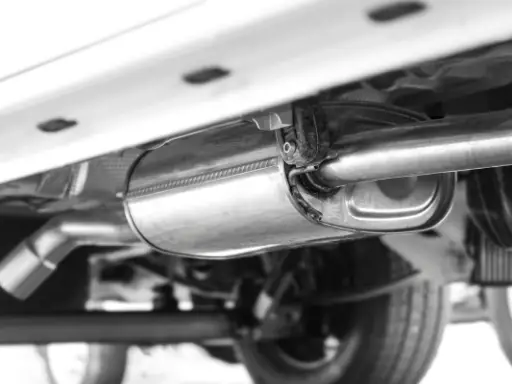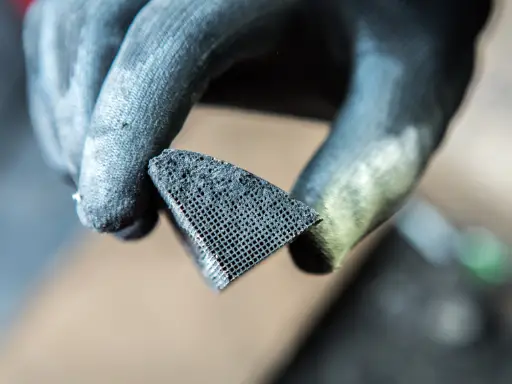The catalytic converters are among our vehicles’ most important emission systems and require periodic inspection. Failure to maintain them can lead to the loss of other emission-related parts like oxygen (O2) sensors.

Do you hear a rattling sound from your catalytic converter? Bad news: that’s not normal. Good news: Depending on how bad the situation is, you can fix it yourself. In this article, you’ll see how to diagnose your cat converter problem and learn how to fix a rattling catalytic converter.
Why does my catalytic converter rattle?
The catalytic converter is a device that converts harmful exhaust gases into less harmful gases. It is usually placed at the end of the exhaust system of vehicles, after the internal combustion engine, and before the mufflers.
To diagnose where the noise is coming from, you should know the main parts of a catalytic converter:
The Heat Shield
This part is attached to the exhaust manifold and protects the converter from heat damage due to high temperatures on the exhaust manifold. The heat shield is essential for keeping heat from the exhaust system. Still, eventually, the washers that give a spacer between the bolts stress and break. Then, the bolt will rattle against it.
The Shell or Casing
This part encloses the honeycomb catalyst inside it, preventing it from being damaged by outside elements. The shell or casing of a catalytic converter may become loose due to corrosion. It can also be damaged if the vehicle’s undercarriage scrapes over something sharp, such as a rock.
The Inner honeycomb or catalyst
The converter is constructed from a ceramic-based composite and many precious metals such as platinum and palladium. Across the nation, catalytic converter theft has been rising because of these precious metals that can reduce harmful emissions from your vehicle’s exhaust system. The National Insurance Crime Bureau reported more than 14,000 catalytic converters were stolen in 2020.

The rattling sound may be coming from the collapsed honeycomb, damaged to wear and tear, or fuel mixture. The catalytic honeycomb breaks into pellets and can cause a rattling sound as it vibrates or bounces against its shell or casing.
How to fix a rattling catalytic converter?
The rattling noise of the catalytic converter may come from loose bolts or screws. You just have to tighten them up to avoid vibration to fix this. You can also clean out the case for any dirt or rust particles. You may have a broken honeycomb or catalyst if the rattling noise doesn’t disappear. If this is the case, you need to replace it with a new one.
Fix loose bolts attached to it
If you’re lucky, your car’s catalytic converter rattles because it has loose bolts or screws attached to it. These bolts hold the muffler and catalytic converter together. Over time, the vibrations from driving can cause these screws to loosen up and allow them to vibrate against each other, causing a rattling sound.
The first thing you should do if you suspect that your catalytic converter is loose is to check all bolts to ensure they’re tight and secure. You can also try tightening them if they appear loose enough to do so without causing damage.
Clean out any debris from the casing
The converter gets very hot during operation. As such, it can be easily damaged by dirt or rust particles entering it from inside the muffler.
Rattling catalytic converters are usually caused by a loose shell or casing around the converter itself, which causes a vibration that makes it rattle. If this happens, you must remove the case and clean out any dirt or rust particles inside it. You can use a brush or vacuum cleaner and then reattach it firmly on top of the converter.
Replace broken honeycomb or catalyst
A broken honeycomb catalyst will cause your car to make a rattling sound when you accelerate or decelerate. The rattling sound would be more pronounced on a highway and increase your speed. The rattling noise can be annoying and embarrassing, especially if driving with others in the car.
If your catalytic converter has been damaged and is rattling, you should take it in for repair as soon as possible. You cannot fix a broken honeycomb catalyst. If it gets broken, you need to replace it with a new one.
How much does it cost to replace a catalytic converter?
Replacing catalytic converters is expensive because they’re complex devices that contain precious metals like platinum and palladium, which make them more durable than their predecessors.
The cost of replacing a catalytic converter can vary based on the car model, the shop you take it to, and the type of catalytic converter you need.
The average cost to replace a catalytic converter is $1,000, but it can be as low as $500 or as high as $2,000, depending on what’s wrong with your car and which shop you go to.
If you’re looking for a new one and want to know what it’s going to cost you, here’s a guide on how much they cost.
Replacement cost
You can estimate your total catalytic converter replacement costs with this simple formula: converter cost + (hourly rate x total time) = total cost. According to Salary.com, the average hourly rate for an automotive mechanic ranges from $20 to $27, with the average hourly pay of $23.
The labor should take between one and two hours. So if you’re driving a Toyota Prius, which also happens to be one of the top targets of catalytic converter thieves, replacing your catalytic converter may cost up to $12,196.
| Car make and model | Catalytic converter price | Labor Cost | Total Replacement Cost |
| Ford F-150 | $1,280 | $54 | $1,334 |
| Honda Accord | $1,970 | $54 | $2,024 |
| Honda Civic | $1,560 | $54 | $1,614 |
| Nissan Altima | $1,380 | $54 | $1,434 |
| Toyota Corolla | $1,685 | $54 | $1,739 |
| Chevrolet Silverado | $1,394 | $54 | $1,448 |
| Chevrolet Malibu | $999 | $54 | $1,053 |
| Toyota Prius | $2,142 | $54 | $2,196 |
Suppose you have a car requiring a new catalytic converter. In that case, we recommend finding a local mechanic or shop specializing in automotive repairs. They’ll be able to give you an accurate estimate of what it will take to replace your catalytic converter and make sure everything goes smoothly during the process.
Conclusion
Not all rattling noise of the exhaust is a sign of a bad catalytic converter. It can also be a sign of some loose parts. The first thing you have to do before seeking a solution is to diagnose what is causing the rattling sound. If the cause is the catalytic converter, you should get it replaced and avoid letting it break.
But if it is just a loose exhaust part and the converter is fine, we recommend you tighten the loose part first and see how it goes. It will cost much less than going through replacing the entire catalytic converter.
